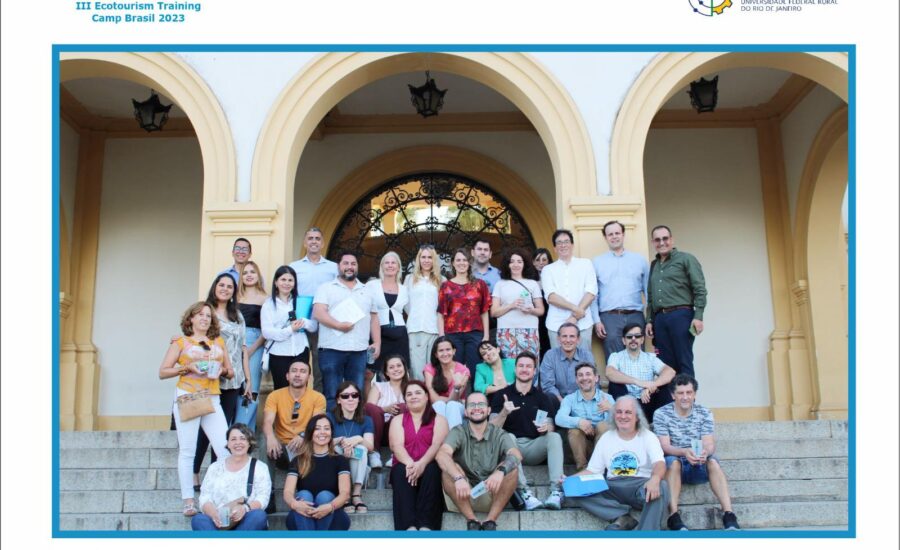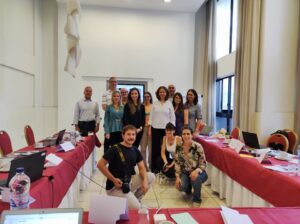From the 11th to the 15th of September, 2023, 31 NATOUR project participants took part in a one-week Ecotourism Training Camp. The activity took place in Rio de Janeiro, Brazil and consisted of a training and capacity transfer camp for the realization of this project. On the first day all participants were welcomed by UFRRJ’ team and were able to learn more about the University’s activity and the progress of the NATOUR project presented by the project coordinator. The following visit of the museum of the former rector and the lake with the unique for the continent capybaras, giant cavy rodent native to South America, made the partners to get in contact better with the place and the atmosphere of the campus. In the afternoon the participants had a meeting with the UFRRJ’ Rector where they talked about the opportunity for collaboration that the NATOUR project provides for the partner universities and also bilateral agreements with the partner Colombian universities were signed.
On the second day, the group visited the Tijuca National Park. In the morning they went to the famous Christ the Redeemer monument and talked with the licensed guides who live in the park about the management of the park and the services provided there. After that the group had a very informative conversation with the ICMBio staff of the Visitor center of the park and explored the main aspects of the exhibition, the interpretation techniques, tools and equipment used. At the end of the visit the participants had the opportunity to share their opinion about the place and their professional advices with the staff about improvement of the visitation dynamics and flow. In the afternoon the camp group listen to a very interesting lecture about Brazilian history made by the local guide Alex and took a nice walk in the Rio Carioca Trail. Surrounded by the Atlantic Forest the partners were able to connect with the natural and historical resources of the place and ended their hike with a talk about Ethic in tourism education given by the representative of the Brazilian partner UnB.
During the third day, the NATOUR delegation went to the Guapi-Mirim protected area. They had a boat trip to the entrance to Guanabara Bay with an onboard explanation about the mangrove ecosystem and biodiversity conservation strategy of the place. For the lunch break the group had a food tasting prepared by Quilombo family with whom they talked about the community life and local initiatives. During their stay in the protected area the participants had the chance to see a local craftwork exhibition organized by women who work in the cooperative managing the protected area.
On the fourth day, the camp team visited the emblematic Golden Lion Tamarin Eco Park where they had the unique chance to see the Golden Lion Tamarin in its natural habitat in the Atlantic Rainforest in Brazil. After the sighting the manager gave a very interesting lecture about the development of the Association, their tremendous efforts to save the population of the Golden Lion Tamarin and the reforestation and conservation activities they are doing on place. The group visited the newly build museum of the Golden Lion Tamarin and planted together a NATOUR tree on the territory of the park. In the afternoon the participants went to a Tower and observe from there a Vegetated Viaduct having the chance to see from first sight the reforestation efforts of the Park staff. Divided in smaller groups the participants were working on different tasks on how to improve the services provided in the park giving certain advices to the manager and his team about what else could be done on the territory of Golden Lion Tamarin Eco Park in term of experience and product design, marketing, etc.
The last day of the III Natour Ecotourism Training Camp Rio 2023 started with the 2nd Natour International Ecotourism Forum hosted by UFRRJ and UnB. The lecturers in the forum were representatives of associations and other stakeholders working in the field of ecotourism who shared their experience and work. The forum was an excellent opportunity to present the project and the starting pilot implementation of NATOUR course, for networking with other organisations that could contribute to promotion of the NATOUR programme. After the forum a closing session with all participants was held in order to share their impressions of the memorable Rio training week.
This was the third of three Ecotourism training camps within NATOUR project.






